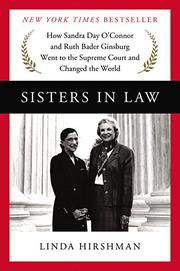This book by lawyer Linda Hirshman gives an inside look at the workings of the Supreme Court--like sausage, you my not like what you find--along with her biographies of the legal careers of Sandra Day O'Connor (SOC) and Ruth Bader Ginsburg (RBG). They were both remarkable women but so very different in their approach to their legal careers and their adjudications. O'Connor could not get a job with a law firm after she graduated from law school--they offered her a position in the stenographers' pool--so she pursued politics as a Republican and eventually became majority leader in the Arizona state legislature. RBG was asked when she entered Harvard Law School why she was taking a place that could have gone to a man. Once graduated, she pursued an academic career becoming a professor at Columbia when Harvard would not have her. Whereas SOC was president of her local Junior League and actively supported Republican candidates, including Barry Goldwater, RBG went to work for the ACLU.
Being the first woman on the court (FWOTSC), O'Connor brought a woman's perspective, if not a liberal one to discussions and decisions. She was very canny in finding a path forward that would elicit the least resistance from the otherwise all male body. She often utilized the "concurrence"--agreeing with the majority opinion and writing a separate comment--to make conservative decisions more liberal and liberal opinions more conservative according to Hirshman. She was the consummate pragmatist.
Ginsburg is, as described by one of her clerks, a "cause lawyer;" that is, she looks at the long picture, both history and future and strategically chooses and works cases to build a foundation toward her goal of justice for all. Although she has been consistently pro-women's rights, she has also consistently been pro-rights for anyone at a disadvantage when up against larger forces.
This is a fascinating book, although at times a bit hard to wade through. Totally worth the read. Much more detailed review of the book from The NYT, a brief review from Kirkus, and an interview with the book's author by NPR's Nina Totenberg.
Being the first woman on the court (FWOTSC), O'Connor brought a woman's perspective, if not a liberal one to discussions and decisions. She was very canny in finding a path forward that would elicit the least resistance from the otherwise all male body. She often utilized the "concurrence"--agreeing with the majority opinion and writing a separate comment--to make conservative decisions more liberal and liberal opinions more conservative according to Hirshman. She was the consummate pragmatist.
Ginsburg is, as described by one of her clerks, a "cause lawyer;" that is, she looks at the long picture, both history and future and strategically chooses and works cases to build a foundation toward her goal of justice for all. Although she has been consistently pro-women's rights, she has also consistently been pro-rights for anyone at a disadvantage when up against larger forces.
This is a fascinating book, although at times a bit hard to wade through. Totally worth the read. Much more detailed review of the book from The NYT, a brief review from Kirkus, and an interview with the book's author by NPR's Nina Totenberg.

No comments:
Post a Comment